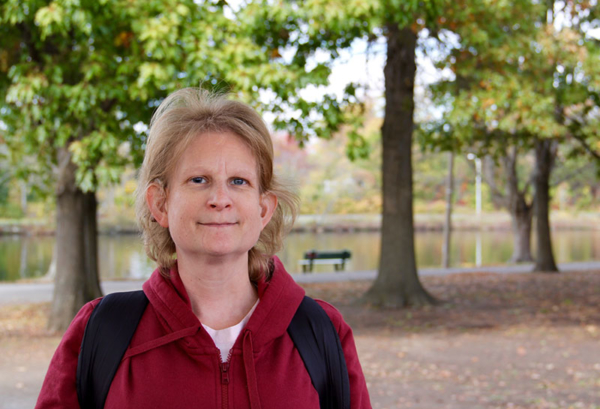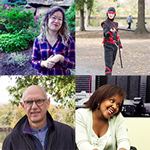Faces Behind the Screen: Liz
Quick Links
<< Return to all “Faces Behind the Screen” stories
“Everybody thinks that accessibility means wheelchairs,” says Liz, who we met at the 2016 Walk4Hearing.
Liz is a property manager with a background in social work. She lives in Brighton, MA and is a member of the Hearing Loss Association of America (HLAA) Boston Chapter. Stories from her life remind us that, despite what we may perceive, not everyone has the same hearing abilities and that alternative sensory aids should be made a priority in every public space.
Liz has progressive sensorineural loss which began around the age of 9, the result of chemotherapy treatment for childhood cancer. The chemotherapy caused an ototoxic hearing loss in her left ear and, many years later, in her right ear, too. From Liz’s perspective, however, it was most certainly for the best.
What was that like to go through cancer at such a young age and then have to start losing your hearing as well?
It all came in the same package. I had so many other long-term follow-up issues. For my parents to make the choice of having that drug and knowing that it was probably going to cause hearing loss, I’m still glad that they chose it, because… it really did help. It really did help after two relapses. So, I’m grateful to be alive.
“My science teacher was [showing] a movie. The entire curriculum was based on a movie with no captions.”
How was it growing up as a child with hearing loss?
It kind of sucked. I think I thought I was doing OK with the hearing aids. In middle school, I used to take my free period to learn how to lip read, which I didn’t realize what the significance of that would be until many years later. It was huge what I get out of lip reading.
Are there people who move their mouths in a way that make it really hard to tell what they’re saying?
Yeah. If people overemphasize things then it doesn’t even help. Shouting won’t help. It’s the idea of overemphasizing [that doesn’t help].
And school was really hard. I didn’t know of my options. There were no IEPs (individualized education programs) heard of at that point.
My science teacher was showing a movie in class. The entire curriculum was based on a movie with no caption. And he pretty much told the whole class that I was deaf or had a hearing loss when I was not there. Without my permission. He was expecting my classmates to save me rather than try to figure out other ways of helping me through the curriculum.
“I only go to the movie theater if there are captions.”
Do you feel like captions have been readily available to you or is that a struggle?
I think more so in the last couple of years. I’ve always had captions on TV. But my brother has, like, 900 degrees of technology on his TV, and he couldn’t figure out how to turn the captions on.
So, I know I depend on them. First thing I got was a captioned land line. And now I’m using actually captions on the cell phone. So, I do feel, for the most part, they have been more and more available. I only go to the movie theater if there are captions.
What was your first memory of a miscommunication?
Well, I don’t know if it’s the first memory, but it does go back a long way, probably in the ’80s. I used to think the Sade song “Smooth Operator” was “Oolasperella.”
I got called into jury duty two years ago. When I got there, they had — they claim they have everything — they had nothing. They kept bringing me out infrared [hearing devices, which are not compatible]. I said, no. I have the amplification. I need clarification. And it was the oldest court in Suffolk County. Courtroom… nothing.
I had hearing aids at that time with a [wired] streamer with a microphone. So, I gave the microphone to the lawyer. But if you give the lawyer the microphone, then the witness doesn’t have it. I’m going back and forth, back and forth.
So, I wrote a letter to the court’s head of accessibility. I disclosed that I wasn’t sure if I was able to hear 100% of what the lawyer and the witness were saying, which eventually found its way to and drew concern from the judge. And the next day I was summoned down to meet with the judge who said, “You know, not everybody makes it through jury duty,” and implied that she has had to let go of jurors who were not absorbing information properly in the court.
So, I had to stand up for myself, and I shared that story: well, I can’t promise you 100%. I have a severe hearing loss. When I was little, I thought “Smooth Operator” was “Oolasperella,” and they all cracked up. And then I was just like, I’m a social worker. I’m always looking for a better environment, a better way to make things better so I can do my part. And they decided to keep me on the jury.
“Even when they think they have good systems, and they do, and you have to teach them and you have to be an educational resource. I think we’ve come a long way, but it is exhausting.”
Do you find that you often have to fight for yourself instead of having accommodations readily available?
Oh, you always have to fight. And I do, but I don’t do it until I get so angry. I’d rather do it when I’m not angry to be setting the tone, and it’s so hard, constantly.
I’ve had to do that in church, actually. They ran out of headsets, and I said to the minister, can you try my personal headset amplification system? And one of the ministers said, “I don’t have the time right now. This is a bad time. You should just come early. Can’t you just get to church earlier?”
And I wrote a huge email. [I said] I do this all the time. I have to advocate for everything. I have to have a plan B for every time plan A doesn’t work out. I never thought I had to do this in my own church. And, boy, did they listen to me.
Even when they think they have good systems, and they do, and you have to teach them and you have to be an educational resource. I think we’ve come a long way, but it is exhausting.
What should hearing people know to better communicate with people who are deaf and hard of hearing?
I think it’s important to try to have a conversation. Everybody is a little bit different. Everybody has different types of hearing loss. Everybody has a good ear, a bad ear. Or, I know someone likes to say, you know, “Please look at me, speak slowly.”
So, I think maybe just taking the time to say, “hey, you mind telling me a little bit about hearing loss? How can I help you?”
“Hearing loss is sometimes invisible, and don’t assume that just because someone gets a hearing aid or an implant that it’s fixed.”
Is there anything else that you want to add?
I just want to remind you, hearing loss is sometimes invisible, and don’t assume that just because someone gets hearing aid or an implant that it’s fixed. It’s not perfect. It’s not going to be 100%. It is what it is. [The technology] is a miracle, but at the same time don’t assume that it’s going to fix it.
—
A huge ‘thank you’ to the Hearing Loss Association of America (HLAA) for hosting this series of interviews at the New England Walk4Hearing in Fall of 2016.
Faces Behind the Screen is a storytelling project focusing on members of the Deaf and hard of hearing community.





